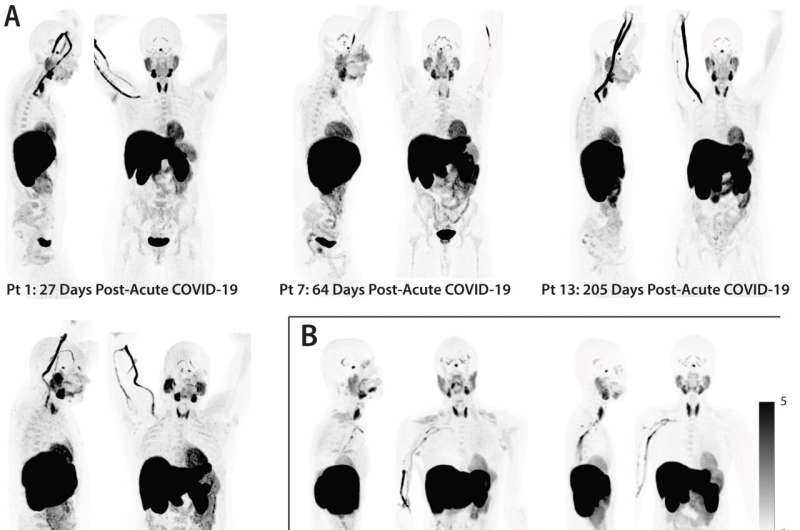A large team of medical researchers at the University of California, San Francisco, and CellSight Technologies has found that some patients who develop long COVID show signs of uncharacteristic immune cell activity in many of their organs and some have traces of SARS-CoV-2 RNA in their guts for up to two years after their initial infection.
In their study, published in the journal Science Translational Medicine, the group analyzed PET scans of 24 people who had recovered from at least one COVID-19 infection.
Over the past several years, medical researchers have found that long COVID is a true biological condition with a variety of symptoms including brain fog and heart, lung and kidney problems. There is currently no treatment beyond symptom management. Scientists are still trying to understand its nature, hoping to prevent the disease in new patients and to treat it in those already infected.
In this new effort, the research team conducted full-body PET scans of 24 people who had survived a SARS-CoV-2 viral infection—such scans highlight metabolic or biochemical function in tissues and organs, helping to diagnose problems.

The scans were conducted 27 to 910 days after initial infection. Among those scanned, 18 had been diagnosed with long COVID. The researchers also used a radioactive tracer drug to highlight immune cell activity throughout the body.
In analyzing the scans, the research team found abnormal T cell activity in the same parts of the body that the patients with long COVID had identified as problematic—in the brain stem, for example, in the patients experiencing brain fog. Surprisingly, the researchers also found abnormal immune cell activity in some organs in those people who did not have long COVID, though to a lesser degree.
The researchers also collected stool samples from five patients diagnosed with long COVID and found traces of SARS-CoV-2 viral RNA that had persisted in their guts for up to two years after the initial infection.
The research team suggests long COVID is a real biological illness and that the SARS-CoV-2 virus can persist in the body much longer than has been thought.
More information:
Michael J. Peluso et al, Tissue-based T cell activation and viral RNA persist for up to 2 years after SARS-CoV-2 infection, Science Translational Medicine (2024). DOI: 10.1126/scitranslmed.adk3295
© 2024 Science X Network
Citation:
Long COVID uncharacteristic immune cell activity and SARS-CoV-2 RNA found in the gut two years after infection (2024, July 8)
retrieved 8 July 2024
from https://medicalxpress.com/news/2024-07-covid-uncharacteristic-immune-cell-sars.html
This document is subject to copyright. Apart from any fair dealing for the purpose of private study or research, no
part may be reproduced without the written permission. The content is provided for information purposes only.

